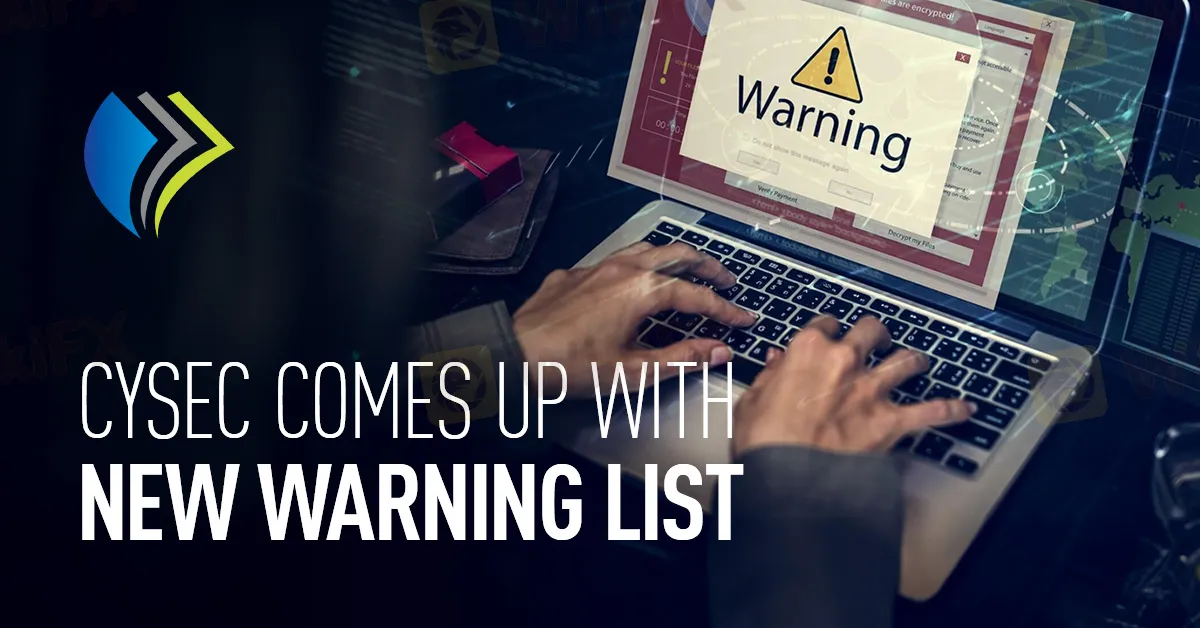简体中文
繁體中文
English
Pусский
日本語
ภาษาไทย
Tiếng Việt
Bahasa Indonesia
Español
हिन्दी
Filippiiniläinen
Français
Deutsch
Português
Türkçe
한국어
العربية
CySEC Comes Up with New Warning List
Abstract:CySEC intensifies actions against unauthorized brokers, blacklisting multiple providers for offering FX and cryptocurrency services without proper authorization. Stricter regulations and penalties are emphasized, urging compliance.

The Cyprus Securities and Exchange Commission (CySEC) has escalated its efforts in the fight against unauthorized brokers by issuing a new warning directed at multiple unlicensed providers. These entities have found themselves on a blacklist due to their offering of trading services in foreign exchange (FX) and cryptocurrencies without the requisite authorization from CySEC.
It's noteworthy that some of these unlicensed entities are falsely asserting affiliations with regulated brokers in Cyprus holding the Cyprus Investment Firm (CIF) License. In response, CySEC has disclosed a list of blacklisted domains associated with these unauthorized providers, which includes apexfinancialtrading.com, bullmarketsllc.com, tcmglobals.com & portal.tcmglobals.com/signup, opticaltradings.com, arkiseguro.com, front-service24.site, miningcity.com & nemtlex.online, evalonassets.com, expertminingcryptocurrency.com, and equityassetholdings.com.

As CySEC continues to reinforce its commitment to more stringent licensing guidelines and operating regulations, certain aspects of the rules and operations are becoming clearer. One prominent change is the obligation for all service providers dealing with crypto assets to register with CySEC. Failure to comply with this stipulation will result in severe consequences, ranging from substantial fines, potentially up to €350,000 ($370,000), to custodial sentences lasting up to five years. Violators may, in some instances, face a combination of both penalties.
In its efforts to address the rise in unregulated and volatile investment products, CySEC has recently released research on retail investment behaviour. The findings revealed a concerning lack of diligence among investors, with a quarter spending only 6-7 days researching a specific product. Additionally, 7% admitted to doing less than 30 minutes of due diligence or none at all before investing. Only 30% of respondents checked their broker's licensing on the country's regulator's website, while 51% relied on company reviews or the firm's own website.
Highlighting the risks associated with online trading, Cypriot regulators launched an educational campaign to inform citizens about potential hazards. The country's financial regulatory body spearheaded the initiative, cautioning against the use of colorful apps that portray trading as empowering rather than intimidating. This campaign aims to address the fear of missing out on easy money and promote a more informed approach to online trading.

Disclaimer:
The views in this article only represent the author's personal views, and do not constitute investment advice on this platform. This platform does not guarantee the accuracy, completeness and timeliness of the information in the article, and will not be liable for any loss caused by the use of or reliance on the information in the article.
Read more

The Hidden Checklist: Five Unconventional Steps to Vet Your Broker
Forex broker scams continue to evolve, employing new tactics to appear credible and mislead unsuspecting traders. Identifying these fraudulent schemes requires vigilance and strategies beyond the usual advice. Here are five effective methods to help traders assess the legitimacy of a forex broker and avoid potential pitfalls.

Doo Financial Obtains Licenses in BVI and Cayman Islands
Doo Financial, a subsidiary of Singapore-based Doo Group, has expanded its regulatory footprint by securing new offshore licenses from the British Virgin Islands Financial Services Commission (BVI FSC) and the Cayman Islands Monetary Authority (CIMA).

CFI’s New Initiative Aims to Promote Transparency in Trading
A new programme has been launched by CFI to address the growing need for transparency and awareness in online trading. Named “Trading Transparency+: Empowering Awareness and Clarity in Trading,” the initiative seeks to combat misinformation and equip individuals with resources to evaluate whether trading aligns with their financial goals and circumstances.

Malaysian-Thai Fraud Syndicate Dismantled, Millions in Losses Reported
The Royal Malaysia Police (PDRM) has received 26 reports concerning the Nicshare and CommonApps investment schemes, both linked to a major fraudulent syndicate led by a Malaysian citizen. The syndicate’s activities came to light following the arrest of its leader by Thai authorities on 16 December.
WikiFX Broker
Latest News
ASIC Sues Binance Australia Derivatives for Misclassifying Retail Clients
WikiFX Review: Is FxPro Reliable?
Malaysian-Thai Fraud Syndicate Dismantled, Millions in Losses Reported
Trading frauds topped the list of scams in India- Report Reveals
AIMS Broker Review
The Hidden Checklist: Five Unconventional Steps to Vet Your Broker
YAMARKETS' Jingle Bells Christmas Offer!
Revolut Leads UK Neobanks in the Digital Banking Revolution
Fusion Markets: Safe Choice or Scam to Avoid?
SEC Approves Hashdex and Franklin Crypto ETFs on Nasdaq
Currency Calculator


